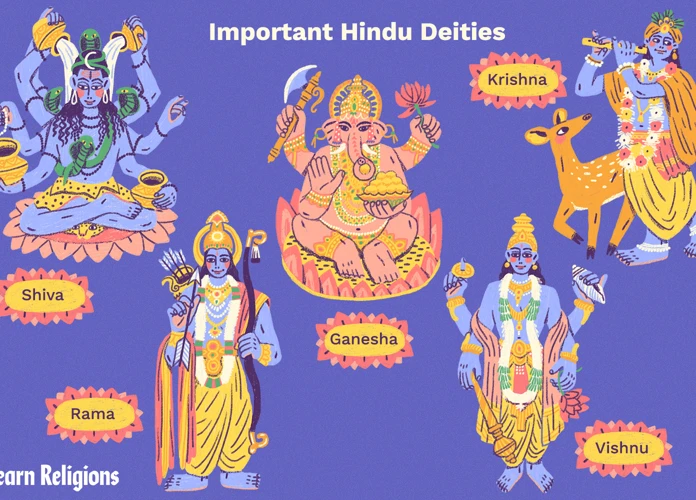The rich tapestry of Hinduism encompasses a pantheon of Gods and Goddesses, each with their own unique powers and attributes. Exploring the depths of this ancient religion reveals a captivating world where deities manifest in diverse forms, from the creator Brahma to the destroyer Shiva, and the nurturing Devi to the ever-present Ganesh and loyal Hanuman. Understanding the significance and powers of these Hindu gods is an essential step towards comprehending the complex and vibrant tapestry of this ancient religion. In this article, we will delve into the divine realms of the Hindu pantheon, uncovering the remarkable abilities and qualities of each deity, while shedding light on the timeless devotion and worship they inspire.
Contents
- The Hindu Pantheon
- The Powers of Hindu Gods
- Worship and Devotion
- Conclusion
-
Frequently Asked Questions
- 1. Who is the most important deity in the Hindu Pantheon?
- 2. What are the different forms in which deities appear in Hinduism?
- 3. How do Hindus worship and show devotion to the Gods?
- 4. What is the role of mythology in Hinduism?
- 5. Why is Ganesh worshipped before the start of any new endeavor?
- 6. Is the concept of femininity prominent in Hindu mythology?
- 7. How does Hanuman embody strength and courage?
- 8. What is the significance of the Trimurti – Brahma, Vishnu, and Shiva?
- 9. Are there any worship rituals specific to each deity?
- 10. Can one worship multiple deities in Hinduism?
- References
-
Frequently Asked Questions
- 1. Who is the most powerful Hindu god?
- 2. How many gods are there in Hinduism?
- 3. What are the different roles of Brahma, Vishnu, and Shiva?
- 4. Is Devi a single goddess or multiple goddesses?
- 5. What is the significance of Lord Ganesh?
- 6. Why is Hanuman known as the Monkey God?
- 7. What are the creation and preservation abilities of Hindu gods?
- 8. How do Hindu gods demonstrate destruction and transformation?
- 9. What are the protection and nurturing skills of Hindu gods?
- 10. How does Hanuman embody strength, courage, and loyalty?
- References
- Read More
The Hindu Pantheon
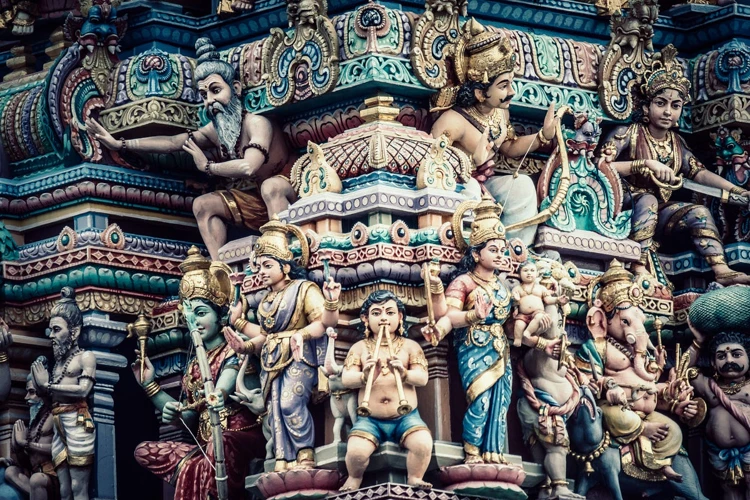
The Hindu Pantheon is a vibrant assembly of divine beings that guide and oversee the intricate workings of the universe. At the heart of this divine collective are gods such as Brahma, the Creator, responsible for the inception of all existence. Another prominent deity is Vishnu, the Preserver, who ensures cosmic balance and upholds righteousness. Shiva, the Destroyer, embodies both the destructive and transformative aspects of life, constantly rejuvenating the universe. The Devi, or Divine Mother, personifies the feminine energy and nurtures all living beings. Ganesh, the Remover of Obstacles, is invoked for success and prosperity, while Hanuman, the Monkey God, exemplifies strength, courage, and unwavering loyalty. Each deity in the Hindu Pantheon plays a unique and significant role, weaving together the intricate tapestry of Hindu mythology and worship. The cosmic dance of these divine beings illustrates the interplay between creation, preservation, and destruction, shaping the destiny of the universe and offering valuable life lessons for devotees to imbibe.
1. Brahma – The Creator
Brahma, known as the Creator, holds a significant position in the Hindu pantheon. In Hindu mythology, he is believed to have emerged from a golden cosmic lotus that sprouted from Lord Vishnu’s navel. Brahma is typically depicted with four faces and four arms, representing his immense knowledge and omnipresence. Each face symbolizes the four Vedas – the sacred texts of Hinduism.
As the Creator, Brahma is responsible for the origin and creation of the universe and all living beings within it. It is said that he created the gods, demigods, humans, animals, and everything else that exists. Brahma brought forth the cosmic order and established the intricate balance that allows life to flourish.
Despite his role as the Creator, Brahma is often not as prominently worshiped as other deities in Hinduism. This is due to a curse placed upon him by the Goddess Saraswati, his own consort. The curse rendered him unworthy of worship from humans. Nevertheless, his significance lies in his association with creation and knowledge.
Brahma is often depicted carrying a rosary, symbolizing the continuous cycle of creation, and a book or the Vedas, signifying his role as the source of divine knowledge. His vehicle, or mount, is a swan, representing grace and purity.
In Hindu cosmology, Brahma’s creation spans vast cycles of time, known as Yugas. Each Yuga has its own characteristics and duration, signifying the continuous cycle of creation, preservation, and destruction that governs the universe.
Despite being less prominently worshiped, Brahma is honored during special occasions and festivals, such as Brahmotsavam, where devotees offer prayers and seek his blessings. Understanding Brahma’s role as the Creator provides a glimpse into the philosophical and spiritual depths of Hinduism, where the divine energy manifests in various forms to create, sustain, and transform the world we live in. (Reference: Black Hole Mergers: A Violent Cosmic Dance)
2. Vishnu – The Preserver
Vishnu, known as the Preserver, is one of the most revered deities in the Hindu pantheon. He is believed to be the embodiment of compassion, protection, and preservation. Vishnu is often depicted with a calm and serene demeanor, adorned with regal attire and holding various symbols of his power. One of his most recognizable attributes is the sacred discus called Sudarshana, which represents his ability to cut through ignorance and bring clarity to the world. As the Preserver, Vishnu is responsible for maintaining cosmic order and balance. He incarnates on Earth in various forms, known as avatars, to protect the world from evil and restore righteousness. Some of his most famous avatars include Lord Rama and Lord Krishna, who are revered for their heroic deeds and teachings. Devotees of Vishnu recognize him as the ultimate protector and guardian, seeking his blessings for guidance, peace, and spiritual upliftment. The worship of Vishnu is a prominent aspect of Hindu religious practices, with temples dedicated to him found all across the Indian subcontinent and beyond. The devotion to Vishnu not only fosters a connection with the divine but also serves as a reminder of the importance of preserving harmony and righteousness in one’s own life and in the world at large.
3. Shiva – The Destroyer
Shiva, known as the Destroyer in the Hindu pantheon, wields immense power and holds a pivotal role in the cosmic balance. With his third eye, Shiva has the ability to see beyond the physical realm and perceive the underlying truth of existence. This destructive aspect of Shiva is not mere chaos or annihilation, but rather a necessary force for transformation and rebirth. Shiva’s association with destruction is symbolic of the transient nature of life and the impermanence of the material world. Through destruction, old and stagnant energies make way for new beginnings and growth. It is through this process that Shiva paves the path for purification and renewal. Despite his fearsome appearance, Shiva is also revered as a compassionate deity who provides solace and guidance to his devotees. He is often depicted in a meditative state, representing his mastery of the inner self and his ability to transcend the material world. As the consort of Devi, the Divine Mother, Shiva represents the union of masculine and feminine energies, highlighting the balance and harmony necessary for spiritual growth and enlightenment. Worshippers of Shiva seek his blessings for strength, transformation, and liberation from the cycle of birth and death. Through devotion to Shiva, individuals can tap into their own inner power and embrace the inevitable changes of life with grace and equanimity.(source)
4. Devi – The Divine Mother
Devi, also known as the Divine Mother, holds a revered position in the Hindu pantheon. She personifies the feminine energy in its purest form, representing compassion, nurturing, and unconditional love. Devi is often depicted with multiple arms, symbolizing her ability to multitask and embrace all aspects of life. She is associated with various forms and manifestations, such as Parvati, Durga, Kali, and Lakshmi, each highlighting a specific facet of her divine nature.
As Parvati, Devi is the gentle and nurturing consort of Lord Shiva. She is the epitome of grace, purity, and marital devotion. Parvati embodies the qualities of a dutiful wife and a caring mother, supporting and providing strength to her family.
In her form as Durga, Devi assumes a fierce and powerful persona. She is the warrior goddess who battles and defeats evil forces, protecting the universe from harm. Durga symbolizes the strength and fortitude required to overcome obstacles and restore balance in life.
Kali, another manifestation of Devi, represents the divine energy of time and transformation. With her black complexion and fierce demeanor, she embodies both destruction and creation. Kali teaches devotees to let go of attachments and ego, embracing change and the cyclical nature of life.
Lastly, as Lakshmi, Devi personifies abundance, wealth, and prosperity. She is the goddess of fortune and fortune, bestowing blessings of material and spiritual riches upon her devotees. Lakshmi is honored during the festival of Diwali, when devotees seek her blessings for a prosperous future.
Devotees of Devi worship her with deep reverence and devotion, seeking her guidance and protection. Her divine qualities inspire individuals, especially women, to embrace their inherent strength, compassion, and nurturing abilities. Devi’s significance goes beyond religious rituals and is a powerful symbol of feminine power, emphasizing the integral role of women in society.
Understanding and connecting with the energy of Devi can provide a deep sense of empowerment, reminding individuals of the divine qualities that reside within them. Just like the ancient Greek society, where women played essential roles in different aspects of life, Hinduism acknowledges and celebrates the vital contributions and virtues of women in society.
[Link: Role of Women in Ancient Greek Society](/role-of-women-ancient-greek-society/)
5. Ganesh – The Remover of Obstacles
Ganesh, also known as Ganesha or Vinayaka, holds a prominent place in Hindu mythology as the deity who removes obstacles and grants success and prosperity to his devotees. Depicted with an elephant head and a human body, Ganesh is revered as the Lord of Beginnings and the Lord of Wisdom. His unique appearance symbolizes intelligence, wisdom, and the ability to overcome challenges. As the Remover of Obstacles, Ganesh is worshipped at the start of new ventures, important ceremonies, and endeavors to ensure a smooth and successful outcome.
Ganesh is often depicted sitting on a lotus flower, symbolizing purity and spiritual awakening. He is known to hold various implements in his multiple hands, the most common being a broken tusk, which he used to write the Mahabharata, one of the great Hindu epics. This broken tusk represents sacrifice and the willingness to give up something valuable for the greater good.
Devotees pray to Ganesh for guidance and assistance in overcoming challenges and obstacles in both material and spiritual realms. His benevolent nature and compassionate demeanor make him approachable and beloved by millions around the world. Whether it’s success in academic pursuits, business ventures, or personal endeavors, Ganesh is believed to be the divine force that removes hindrances and paves the way for success.
To seek his blessings, devotees often offer prayers, chant mantras, and perform ritualistic ceremonies. The most recognizable mantra associated with Ganesh is “Om Gam Ganapataye Namaha”, which invokes his divine presence and seeks his guidance. Many also honor Ganesh during the festival of Ganesh Chaturthi, celebrating his birth with grandeur and devotion.
In addition to his role as the Remover of Obstacles, Ganesh is also believed to bring prosperity and fortune to his devotees. His association with the elephant represents strength, intelligence, and good luck. His presence is often seen in homes, offices, and businesses, where devotees place his idols or images, seeking his blessings for success and prosperity in their endeavors.
Ganesh holds a cherished place in Hindu mythology as the deity who helps overcome challenges, clears obstacles, and grants success. His wisdom, compassion, and ability to remove hurdles make him a beloved figure in Hindu worship, inspiring devotees to approach life’s challenges with resilience and determination.
6. Hanuman – The Monkey God
Known as the Monkey God, Hanuman holds a special place in Hindu mythology and devotion. Hanuman is revered for his strength, courage, and unwavering loyalty. He is depicted as a humanoid figure with the face of a monkey, symbolizing his connection to the Vanara, a race of ape-like beings. According to Hindu scriptures, Hanuman played a crucial role in the epic tale of the Ramayana, where he supported Lord Rama in his quest to rescue his wife, Sita, from the demon king Ravana.
Hanuman’s unparalleled physical strength is often portrayed through his ability to grow to immense sizes, leap across great distances, and perform incredible feats of strength. This power symbolizes his unwavering commitment to righteousness and his relentless pursuit of justice. His devotion to Lord Rama is unwavering, and he embodies the qualities of loyalty, courage, and selflessness.
Devotees of Hanuman believe that his worship can bring protection, courage, and strength in times of adversity. Hanuman is considered a remover of obstacles and a harbinger of success. His name is often chanted or repeated in times of distress, symbolizing the call for his divine intervention and guidance.
Temples dedicated to Hanuman are widespread throughout India, where devotees gather to offer their prayers and seek his blessings. It is believed that reciting the Hanuman Chalisa, a sacred hymn dedicated to him, can bring immense spiritual and personal benefits.
The tale of Hanuman is not only a testament to his divine might but also serves as an embodiment of the virtues that devotees aspire to cultivate in their own lives. Hanuman’s story teaches us the importance of unwavering loyalty, courage in the face of adversity, and the power of selflessness. He serves as an inspiration for millions, and his presence in Hindu mythology is a testament to the power and relevance of his character even today.
The Powers of Hindu Gods
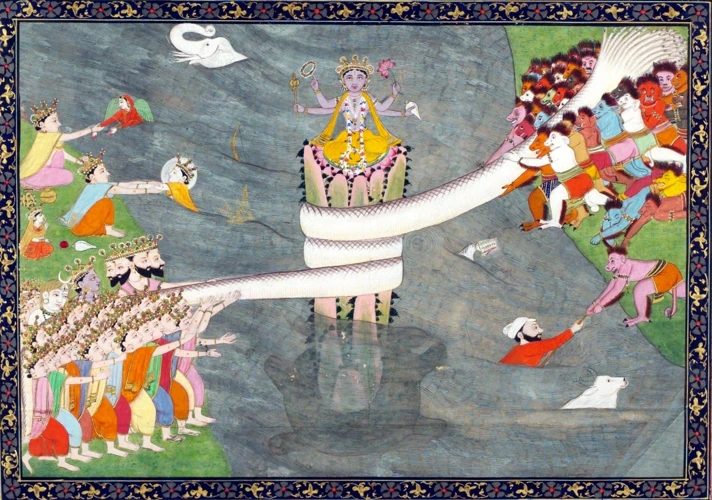
The powers of Hindu gods are as diverse and dynamic as the pantheon itself. Through their distinct abilities and qualities, they govern the cosmic order and influence the lives of their devotees. One of the prominent powers exhibited by these deities is the ability to create and preserve, exemplified by Brahma and Vishnu. Brahma possesses the power of creation, bringing forth life and shaping the universe, while Vishnu preserves and maintains cosmic balance. On the other hand, Shiva embodies the power of destruction and transformation, symbolizing the cyclical nature of existence. Devi, the Divine Mother, encompasses the powers of protection and nurturing, providing love and solace to her devotees. Ganesh, the Remover of Obstacles, possesses the power to eliminate barriers and bring success. Lastly, Hanuman showcases the powers of strength, courage, and loyalty through his unwavering dedication. Each divine entity within the Hindu pantheon possesses unique powers that contribute to the intricate web of cosmic forces, offering guidance, protection, and blessings to those who seek them.
1. Creation and Preservation Abilities
The Hindu gods are revered for their remarkable abilities, and one of the key aspects that sets them apart is their power of creation and preservation. Let’s delve into the divine abilities of the gods in this realm:
– Brahma: Brahma, known as the Creator, possesses the unique capability to bring into existence the entire cosmos and all its beings. It is believed that he creates and gives life to everything that exists. Brahma is often depicted with four heads, representing his vast knowledge and omniscience.
– Vishnu: Vishnu, the Preserver, is responsible for maintaining the cosmic order and ensuring the preservation of the universe. He appears in various avatars or incarnations, stepping into the mortal realm to restore balance whenever it is threatened. His ten avatars, including Lord Rama and Lord Krishna, showcase his ability to protect and nurture life.
– Devi: The Divine Mother, or Devi, plays a vital role in the creation and preservation of the universe. She embodies feminine power and is worshiped in different forms such as Durga, Lakshmi, and Saraswati. Devi represents the nurturing and compassionate aspects of existence, offering love and protection to her devotees.
– Ganesh: Ganesh, also known as the Remover of Obstacles, possesses the power to clear away hurdles and pave the way for new beginnings. Though primarily revered as the obstacle remover, Ganesh’s association with creation is seen in the belief that he scribed the epic Mahabharata as the sage Vyasa’s scribe.
The Hindu gods exhibit awe-inspiring creation and preservation abilities. Brahma’s creation, Vishnu’s preservation, Devi’s nurturing, and Ganesh’s obstacle removal highlight the various aspects of this divine power within the Hindu pantheon. Each deity reflects a different facet of creation and preservation, adding depth and meaning to Hindu mythology and worship.
2. Destruction and Transformation Capabilities
Destruction and Transformation Capabilities
The Hindu gods are not only creators and preservers but also possess immense powers in the realm of destruction and transformation. This aspect of their capabilities reflects the cyclical nature of existence, where old must make way for the new, and change is inevitable. One prominent deity associated with destruction and transformation is Shiva. Known as the Destroyer, Shiva’s power lies in his ability to dissolve the universe to its primal state, paving the way for rebirth and renewal. He is often depicted in a fierce form, adorned with skulls and surrounded by fire, symbolizing the destruction of ignorance, ego, and attachments that hinder spiritual growth. Another deity associated with transformation is Kali, a fearsome and powerful goddess who annihilates evil forces and brings about radical changes. Kali’s iconography, with her wild hair and multiple arms wielding weapons, signifies her capacity to destroy negativity and facilitate spiritual evolution.
In Hindu mythology, destruction is not seen as something purely negative but rather as a necessary part of the cosmic cycle. It clears the path for new beginnings, releases stagnant energies, and allows for growth and transformation. Destruction can take various forms, including the dismantling of societal norms, mental barriers, and internal obstacles that hinder personal progress. The gods’ destruction and transformation capabilities remind us that change is inherent in life and that embracing it can lead to personal and spiritual growth. Whether through the fierce dance of Shiva, the ferocious wrath of Kali, or the transformative force of other deities, Hindu mythology teaches us to recognize the temporary nature of existence and to adapt, evolve, and embrace transformation.
3. Protection and Nurturing Skills
Protection and nurturing are essential aspects of the divine powers exhibited by certain Hindu gods. One deity known for their protective and nurturing skills is Devi, the Divine Mother. Devi embodies the feminine energy and is revered as the ultimate source of love, compassion, and protection. She is believed to safeguard her devotees from harm and evil forces, offering them solace and support in times of distress. Devi is often depicted with multiple arms, each holding symbolic objects representing her various powers. In her nurturing aspect, she is known as Durga, the fierce warrior goddess who protects her devotees from injustice and oppression. Durga is worshipped during the festival of Navaratri, where her nine forms are celebrated, each representing a different aspect of protection and nurturing. Another goddess associated with protection is Lakshmi, the goddess of wealth and fortune. She is believed to bring prosperity and abundance to her devotees, shielding them from financial hardships. Worship and devotion to these goddesses are considered a means of seeking their blessings and invoking their protective energies in one’s life. The nurturing aspect of Hindu gods extends beyond the goddesses, as Vishnu, the Preserver, also demonstrates caring and protective qualities. Vishnu is often depicted as a peaceful deity who incarnates on earth to restore balance and protect the righteous. His avatars, such as Rama and Krishna, exemplify heroism and selflessness, providing guidance and protection to their devotees. In Hindu mythology, protection and nurturing skills are integral to the divine powers of these gods and goddesses, bestowing devotees with a sense of security and well-being.
4. Wisdom and Knowledge Proficiency
The Hindu gods possess a wealth of wisdom and knowledge, showcasing their profound intellectual prowess and enlightenment. One prime example is Brahma, the Creator, who is often depicted with four heads representing the four Vedas, the sacred texts of Hinduism. This signifies his vast knowledge and understanding of the universe. Another deity renowned for wisdom is Vishnu, the Preserver, whose avatars like Lord Krishna and Lord Rama showcase intelligence and strategic thinking in their actions. Saraswati, the Goddess of Knowledge, Arts, and Learning, is revered for her mastery of intellectual pursuits, representing the embodiment of wisdom itself. Devotees seek her blessings to enhance their intellect and learning abilities. The revered sage Lord Dattatreya is another embodiment of wisdom, as he is said to have acquired knowledge from all sources to become the ultimate teacher. Wisdom and knowledge proficiency are revered qualities among Hindu gods, emphasizing the significance of intellectual growth and enlightenment in Hinduism.
5. Removal of Obstacles and Barriers
Ganesh, also known as Ganesha or Vinayaka, holds a special place in Hindu mythology as the Remover of Obstacles and Barriers. This revered deity is often depicted with the head of an elephant and a pot-bellied human body, symbolizing wisdom, intelligence, and prosperity. Ganesh’s divine intervention is sought by devotees to overcome hurdles and challenges in various aspects of life.
As the Lord of Beginnings, Ganesh is invoked at the start of any new venture, be it a business endeavor, academic pursuit, or even a wedding. This is because Ganesh is believed to possess the power to remove all obstacles from the path and ensure a smooth journey towards success. His elephantine head signifies his ability to see beyond the mundane and foresee any potential roadblocks that may hinder progress.
Devotees of Ganesh often offer prayers and perform rituals to seek his blessings for the removal of obstacles. One such ritual is the Ganesh Chaturthi, a vibrant festival celebrated with enthusiasm across India. During this time, elaborate idols of Ganesh are worshipped, and processions fill the streets with music and revelry. It is believed that by immersing the idol in water at the end of the festival, devotees symbolically let go of their obstacles and seek Ganesh’s intervention for their removal.
Beyond material obstacles, Ganesh is also revered for his ability to remove mental and spiritual barriers. He is seen as a guide who helps individuals overcome their inner fears, doubts, and limitations. By surrendering oneself to Ganesh’s divine presence and seeking his blessings, devotees seek clarity of mind, strength of conviction, and the courage to face life’s challenges head-on.
In essence, Ganesh’s role as the Remover of Obstacles and Barriers is deeply rooted in the belief that through his divine grace, one can transcend limitations and achieve success and fulfillment in various aspects of life. Whether it be tangible hindrances or intangible limitations of the mind and spirit, invoking Ganesh’s assistance offers solace, strength, and a renewed sense of determination to overcome all obstacles on the path to one’s goals and aspirations.
6. Strength, Courage, and Loyalty
When it comes to embodying strength, courage, and loyalty, Hanuman stands as an epitome among the Hindu gods. Hanuman, known as the Monkey God, is revered for his unwavering devotion to Lord Rama. He is depicted as a strong and mighty warrior who fearlessly takes on any challenge and overcomes insurmountable obstacles. Hanuman’s physical strength is said to be unmatched, allowing him to perform incredible feats and carry out monumental tasks. Legends tell of his ability to lift mountains, leap across vast distances, and even transform his size at will.
But it is not just Hanuman’s physical strength that sets him apart. His immense courage is evident in his unwavering desire to serve and protect his Lord. He fearlessly confronts demons and adversaries, never faltering in his commitment to righteousness. Hanuman’s loyalty to Lord Rama is unparalleled, symbolizing the ideal of unwavering devotion and dedication. It is said that his devotion is so profound that even the mention of his name fills the hearts of devotees with love, courage, and strength.
In Hindu mythology, Hanuman’s story serves as a powerful reminder of the strength and courage that lie within each individual. His unwavering loyalty to Lord Rama inspires devotees to emulate his qualities in their own lives. Hanuman teaches us that with dedication, courage, and loyalty, we can overcome any obstacle that stands in our way and achieve greatness. He stands as a symbol of hope, reminding us to tap into our inner strength and unleash our true potential in the face of adversity.
Whether through his physical prowess, indomitable courage, or unwavering loyalty, Hanuman continues to be a guiding light for believers, offering them strength, inspiration, and the fortitude to navigate the journey of life.
Worship and Devotion
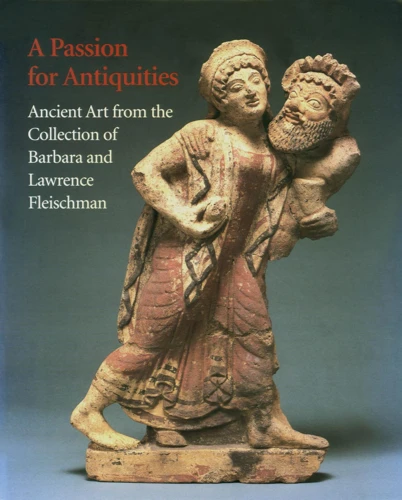
Worship and devotion are integral aspects of Hinduism, as followers engage in rituals and practices to honor and seek the blessings of the divine deities. Hindus express their devotion through various forms, such as personal prayers, visiting temples, participating in religious ceremonies, and observing fasting periods. One of the fundamental aspects of worship is the use of puja, where devotees offer prayers, flowers, incense, and other symbolic items to the gods. Temples, adorned with intricate carvings and vibrant sculptures, serve as sacred spaces for spiritual contemplation and connection with the divine.
Festivals hold immense significance in Hindu worship, allowing devotees to celebrate and express reverence towards specific gods and goddesses. For example, during the festival of Diwali, the triumph of light over darkness is celebrated by lighting oil lamps and fireworks in honor of Devi, the goddess of prosperity and good fortune. Similarly, Ganesh Chaturthi is dedicated to Lord Ganesh, with elaborate processions, devotional singing, and the immersion of his idol in water bodies.
Devotion is not limited to formal rituals; it also encompasses the practice of bhakti yoga, the path of devotion and unwavering love for the divine. Bhakti yoga involves cultivating a deep emotional connection and surrendering oneself to the chosen deity. This can be achieved through chanting mantras, singing devotional songs, or reciting sacred texts like the Bhagavad Gita and the Ramayana. Devotees believe that by offering their love, gratitude, and loyalty to the gods, they attain spiritual union and liberation from the cycle of birth and death.
In addition to personal devotion, community worship plays a vital role in Hinduism. Satsangs, spiritual gatherings where devotees come together to chant, meditate, and share stories of the divine, foster a sense of unity and spiritual growth. These collective expressions of faith strengthen the bond between individuals and their gods, creating a profound sense of belonging and purpose within the wider Hindu community.
Worship and devotion form the cornerstone of Hindu religious practice, providing devotees with a means to connect with the divine, seek blessings, and navigate life’s challenges with faith and spiritual guidance. It is through these acts of worship and devotion that Hindus experience a deep sense of fulfillment, discovering the presence of the divine in every aspect of existence.
Conclusion
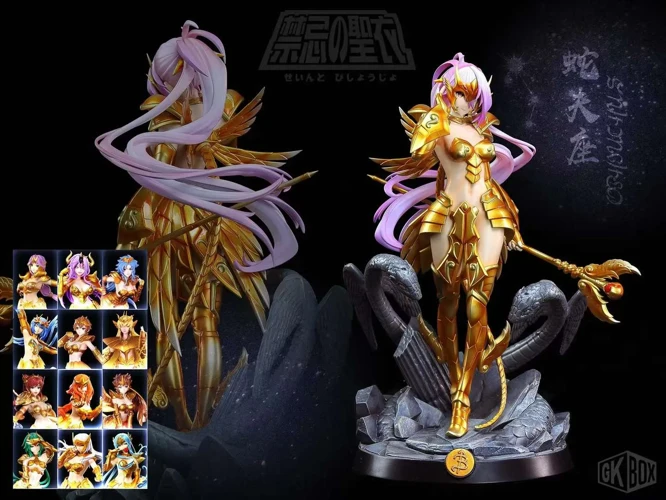
In conclusion, delving into the world of Hinduism and the multitude of gods and goddesses in the Hindu pantheon provides a fascinating insight into the complexities of this ancient religion. The Hindu gods possess an array of powers and abilities that reflect various aspects of human existence, from creation and preservation to destruction and transformation. Brahma, the Creator, sets the stage for life’s inception, while Vishnu, the Preserver, ensures its harmony and continuity. Shiva, the Destroyer, enables transformation and rejuvenation, while Devi, the Divine Mother, nurtures and protects all beings. Ganesh, the Remover of Obstacles, helps navigate life’s challenges, and Hanuman, the Monkey God, embodies strength, courage, and loyalty. Each deity embodies unique qualities and attributes, making them objects of reverence and devotion for millions of followers around the world. Worship and devotion to these gods play a crucial role in the lives of Hindus, providing a pathway for spiritual growth, enlightenment, and fulfillment.
As we navigate the complexities of life, the Hindu gods and their powers serve as guiding forces, providing inspiration and wisdom. Whether seeking creative endeavors, protection, knowledge, success, or courage, devotees find solace in the divine presence of these mighty beings. The Hindu pantheon is a testament to the multifaceted nature of existence and the perpetual cycles of creation, preservation, and transformation that shape the universe.
In the broader context, the Hindu pantheon emphasizes the interconnectedness of all things and the belief that divinity can manifest in various forms. It highlights the diversity and inclusivity intrinsic to Hinduism, where devotees are free to choose their preferred deity based on personal inclination and needs. The gods and goddesses are not distant entities but are deeply involved in the lives of their devotees, offering guidance, protection, and blessings.
In summary, the Hindu pantheon represents a tapestry of gods and goddesses with unique powers, encapsulating different facets of human existence. They inspire devotion, offer solace, and guide individuals on their spiritual journeys. Understanding and appreciating the powers of these deities allow us to embrace the profound teachings and wisdom contained within Hindu mythology and philosophy. May the diverse pantheon of Hindu gods continue to inspire and uplift humanity, serving as eternal symbols of hope, love, and transcendence in an ever-changing world.
Frequently Asked Questions

1. Who is the most important deity in the Hindu Pantheon?
The most important deity in the Hindu Pantheon is subjective and depends on individual beliefs. However, Brahma, Vishnu, and Shiva are often considered the Trimurti, representing creation, preservation, and destruction respectively.
2. What are the different forms in which deities appear in Hinduism?
Deities in Hinduism appear in various forms, such as animals, humans, and mythical creatures. These diverse manifestations symbolize different aspects of their powers and qualities.
3. How do Hindus worship and show devotion to the Gods?
Hindus worship and show devotion to the Gods through rituals, prayers, offerings, and visiting temples. They also engage in meditation, chanting mantras, and observing religious festivals with great enthusiasm and reverence.
4. What is the role of mythology in Hinduism?
Mythology plays a crucial role in Hinduism as it conveys profound spiritual truths, moral lessons, and cultural values. It provides a framework for understanding the universe, the nature of divinity, and the purpose of human existence.
5. Why is Ganesh worshipped before the start of any new endeavor?
Ganesh is worshipped before the start of any new endeavor because he is believed to be the remover of obstacles. Devotees seek his blessings to ensure a smooth and successful journey, free from hindrances and challenges.
6. Is the concept of femininity prominent in Hindu mythology?
Yes, the concept of femininity is paramount in Hindu mythology. Goddesses such as Devi, Lakshmi, Saraswati, and Durga represent various aspects of feminine energy, symbolizing power, nurturing, creativity, and wisdom.
7. How does Hanuman embody strength and courage?
Hanuman embodies strength and courage through his unwavering loyalty and dedication to Lord Rama. His physical prowess, fearlessness, and unwavering devotion make him an epitome of bravery and loyalty.
8. What is the significance of the Trimurti – Brahma, Vishnu, and Shiva?
The Trimurti – Brahma, Vishnu, and Shiva – represents the three fundamental forces of creation, preservation, and destruction. They symbolize the continuous cycle of life, death, and rebirth, highlighting the interconnectedness of all aspects of existence.
9. Are there any worship rituals specific to each deity?
Yes, there are specific worship rituals associated with each deity, including the recitation of mantras, offering of flowers, fruits, and incense, and performing aarti (ceremonial waving of lights) as a mark of devotion and reverence.
10. Can one worship multiple deities in Hinduism?
Yes, Hinduism allows for the worship of multiple deities. Each deity represents different aspects of the divine and provides devotees with a unique connection and avenue for spiritual growth and fulfillment.
References
- The Main Hindu Deities | Brahma, Vishnu, & Shiva
- The 8 Hindu Gods and Goddesses You Should Know About!
Frequently Asked Questions

1. Who is the most powerful Hindu god?
It is believed that all Hindu gods possess great power, but Lord Shiva is often considered the most powerful. His role as the destroyer symbolizes the cyclical nature of life and creation.
2. How many gods are there in Hinduism?
Hinduism is a diverse religion with a pantheon of gods and goddesses. While it is difficult to ascertain an exact number, some sources estimate that there are over 33 million gods in Hinduism.
3. What are the different roles of Brahma, Vishnu, and Shiva?
Brahma is the creator deity, responsible for bringing the universe into existence. Vishnu is the preserver who ensures the orderly functioning of the cosmos. Shiva, on the other hand, is the destroyer, representing the transformative aspect of life.
4. Is Devi a single goddess or multiple goddesses?
Devi is a term used to refer to the divine feminine power in Hinduism. She is often worshipped in various forms, including Durga, Kali, Lakshmi, and Saraswati. While these are distinct goddesses, they are all manifestations of the same divine energy.
5. What is the significance of Lord Ganesh?
Lord Ganesh, also known as Ganesha or Vinayaka, is revered as the remover of obstacles and the god of wisdom. Devotees seek his blessings before beginning any new endeavor or venture.
6. Why is Hanuman known as the Monkey God?
Hanuman is known as the Monkey God because he is depicted with the face of a monkey. He is revered for his unwavering devotion to Lord Rama and is considered the epitome of strength, courage, and loyalty.
7. What are the creation and preservation abilities of Hindu gods?
Hindu gods like Brahma and Vishnu possess the power to create and preserve the universe. Brahma is credited with the creation of life and the cosmos, while Vishnu ensures its continuity and balance.
8. How do Hindu gods demonstrate destruction and transformation?
Lord Shiva embodies the power of destruction and transformation. He is believed to destroy what is old and stagnant to make way for new beginnings. This transformative aspect symbolizes the cycle of birth, death, and rebirth.
9. What are the protection and nurturing skills of Hindu gods?
Hindu gods like Devi are known for their protective and nurturing qualities. Devi shields her devotees from evil forces and provides them with strength and guidance. She is often depicted as a caring mother figure.
10. How does Hanuman embody strength, courage, and loyalty?
Hanuman’s unwavering loyalty to Lord Rama, his incredible strength, and fearless courage make him an embodiment of these traits. He played a crucial role in the epic Ramayana and is revered for his devotion.

